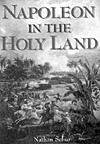
Author: Nathan Schur
Pages: 224
Illustrations: 23 black and white period engravings, paintings and
lithographs.
Maps: 8, showing strategic situations and general movements of troops.
Footnotes: 307
Appendices: 13, including translated manuscript sources such as reports,
letters, diary extracts, etc.
Bibliography: 39 primary sources and 35 "later works"
Index: 149 entries
Publisher: Greenhill Books, London
Publication Date: 1999
Binding: Cloth (hardbound)
ISBN: 1-85367-345-5
Price: $34.95
Summary: Nathan Schur provides the newest English language account of
Napoleon's 1799 Syrian expedition. An entertaining synthesis of
European, Hebrew, and Arabic sources, it provides new insight into this
little-known campaign that saw General Bonaparte's first major military
failure.
A noted authority on the history of Palestine, Nathan Schur is the author of numerous historical works in several languages. This is the most recent look at General Napoleon Bonaparte's 1799 campaign in Syria. Combining tremendous detail with an engaging style, Schur describes the hectic pace of the expedition which lasted only about three months, but featured three sieges, plus one naval and eight land battles. He is fascinated by the young Bonaparte's generalship, highlighted by Mount Tabor, "one of his greatest victories," to the siege of Acre: "his most severe setback."
Early chapters explain why the French invaded Egypt in 1798, along with the political dissolution of the Ottoman Empire. This sets the stage for a description of Ahmad al-Jazzar, Bonaparte's adversary in 1799. Although Ahmad was the first as well as one of the few commanders to defeat Napoleon, he is often relegated to a few lines in most histories. Schur brings the notorious "butcher" to life and defines him as a dangerous and skilled opponent.
Why did Bonaparte attack Syria? Schur contends the young general had reasonable strategic views, but also somewhat of an Alexander complex. As Schur puts it, "There was, indeed, in Napoleon's mental make up a romantic and slightly fantastic element, which did not flower fully under Europe's pale skies, but stretched its wings under the strong sun of the east."
Schur provides a critical examination of Bonaparte's controversial massacre of Ottoman prisoners at Jaffa. Schur concludes that this was primarily calculated terror designed to cow further resistance. The execution of nearly 2,500 men was Bonaparte's effort to out-butcher the "butcher" of Acre, Ahmad al-Jazzar.
Apparently it was a miscalculation, for the mass execution compelled Acre's garrison to fight harder. Here Schur provides a first-rate account of the 61-day siege, an affair featuring strange combinations of modern and ancient tactics. In between, he gives a lively account of French efforts to dominate Palestine, and describes the open battles like Mount Tabor and Nazareth.
Utilizing his command of Hebrew and Arabic sources, Schur presents much new information on French-Muslim-Christian-Jewish interaction. His account of Palestinian resistance from Jabal Nablus, and Bonaparte as a proto-Zionist are fascinating.
Schur points to Bonaparte as "the main reason for the French defeat in front of Acre." Overconfident, impatient, and unimaginative, he launched poorly prepared piecemeal attacks that frittered away his army. Ahmad al-Jazzar, ably assisted by Sir Sidney Smith, used his resources better to outlast the future French Emperor.
Bonaparte was forced to retreat to Jaffa, where Schur investigates another controversy. Decimated by casualties, sickness, and the plague, the French were hard pressed to move their invalids. Many were abandoned along the roads, and one group was left behind at Jaffa.
Did Bonaparte order these men poisoned? Schur examines the evidence and suggests this to be an anti-Bonaparte myth fostered by hostile authors. As always, he presents contrasting views before his own summation. Napoleon in the Holy Land combines sound research, good writing, a useful bibliography, excellent maps, and interesting illustrations. There are a few minor problems. This reviewer does not agree with Schur's account of Ahmad al-Jazzar's early life. He was not, as the author puts it, an "executioner," and his sobriquet "butcher" came from one specific act of revenge, rather than a series of actions.
One might also like to see more attention given to Sir Sidney Smith. Still, these are small issues. With so few books available on the topic, this well written account by Nathan Schur is an important contribution.
Napoleonic Library
-
Book Review: Eagles Over the Alps
Book Review: Napoleon and History Painting
Book Review: Napoleon's Elite Cavalry
Book Review: Napoleon in the Holy Land
Book Review: Napoleon and Austerlitz
Book Review: Blundering to Glory
Book News: Review Policy
Book Review: Followup: Greenhill Napoleonic Wars Data Book
Book Review: Errata for Swords Around the Throne
Back to Table of Contents -- Napoleon #15
Back to Napoleon List of Issues
Back to MagWeb Master Magazine List
© Copyright 2000 by Napoleon LLC.
This article appears in MagWeb (Magazine Web) on the Internet World Wide Web.
The full text and graphics from other military history magazines and gaming magazines are available at http://www.magweb.com
Order Napoleon magazine direct